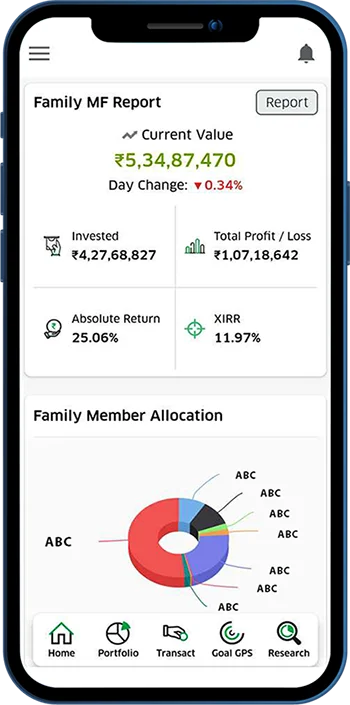You can download the complete portfolio report including mutual funds & other assets. Get the historical performance of your portfolio easily & track the portfolio at your fingertips.
Great financial advice starts with an understanding of your personal, financial and lifestyle goals At Spring we help you.
Goals without a plan are just a dream – so at Spring our team of industry experts will work with you to develop strategic plans.
Plans require action or they are just words – at Spring we work with you to implement your strategic plans

You can download the complete portfolio report including mutual funds & other assets. Get the historical performance of your portfolio easily & track the portfolio at your fingertips.
We offer a 100% paperless process of investment. It takes a few seconds to register a SIP or Purchase an ELSS.
Give purpose to your investments, you can map all your investments with the goal like child education, marriage or retirement.
Invest in well researched cherry-picked perfectly balanced portfolio.

Web Designer

Impressed with their financial expertise, they've boosted my investments and guided me to success. I highly recommend their services.
SEO Analyst

Incredible support and guidance – they've helped me achieve financial stability and growth quickly. I'm a highly satisfied client.
Web Designer

These experts transformed my finances, securing my future and boosting my investments. It is a game-changer. I highly recommend them.
Web Designer

By Admin | February 7th, 2024
Women are known to be multi-taskers. Women are better at switching between tasks and juggling multiple tasks simultaneously, be it packing lunches, getting kids ready for school, handling appointments or social engagements.
Modern women are rockstars who are breaking all stereotypes about being the weaker gender; as a result, financial planning for women is no longer considered taboo.
But it is also a fact that women are not responsible for financial planning due to social conditioning and patriarchal customs.
WHY FOCUS ON FINANCIAL PLANNING FOR WOMEN?
Since the dawn of time, women and financial planning have been intrinsically linked. Women have always been in charge of home finances. So, there are several compelling reasons for women to become involved in personal financial management.
Small, prudent measures can help you increase your money, attain your financial objectives, and retire like a queen while still allowing you to indulge in the odd shopping binge, overseas vacation, or anything else you like.
There is, of course, a more remarkable change in today’s work culture and more cooperation from family members that more women are working today than ever before. However, because of their caregiving obligations, women spend less time in the workforce, opting for part-time/low-paying jobs/service positions that are not covered by pension plans, receive fewer pension benefits and lower wages due to gender differences. Due to which they are unable to support themselves financially.
IMPORTANCE OF FINANCIAL PLANNING FOR WOMEN
It is a good time for women to be financially independent and take charge of their finances. With easy access to internet information, shifting societal norms, and the ability to earn and invest, women must overcome the stigma and face financial difficulties straight on.
One investment advice for women, whether single, married, homemaker, divorcee or separated, is to do the following:
In the next section, we’ll explain how to undertake financial planning for women at any stage of life.

By Admin | February 7th, 2024
Using a structured investment plan like SIP to invest in mutual funds has become quite popular. Continue reading to learn why mutual funds are such an excellent way to invest, along with the benefits of SIP to support your future financial goals.
Everyone has dreams, ambitions, and objectives they want to attain. For example, everyone wishes to be financially secure in their lives. For example, a new car, a bigger house, or a family vacation to an exotic location. However, you can only achieve your objectives if you put up the effort necessary to make them a reality.
Using a Systematic Investment Plan (SIP) to invest in mutual funds might be a straightforward solution to help you reach your objectives. So, let's look at what SIP stands for, how they operate, the benefits of SIP, and how your financial goals can seem attainable by investing in SIP
WHAT IS SIP?
A Systematic Investment Plan (or SIP) is a mutual fund investment that allows you to invest over time. It is a systematic way of regularly investing fixed amounts of funds, such as monthly, quarterly, or semi-annual. It may be simpler to reach your financial objectives if you invest consistently in this manner.
SIP in mutual funds is a monthly investment plan in which you invest a certain amount of money in a scheme of your choice. The money is automatically deducted from your bank account because of the setup.
HOW DOES SIP WORK?
A systematic investment plan (SIP) is a simple instrument that allows you to create wealth by making small, regular deposits over a longer time horizon. There are many benefits of SIP investment in mutual funds.
When you start SIP in a mutual fund scheme, you can buy a set number of fund units. You can invest in the fund at both highs and lows. You don't have to time the market to earn money. This element of uncertainty is removed with SIP investing.
You can select to automate your investments once you've chosen the investment term and frequency. Then, give your bank a standing instruction to transfer money from your bank account to the mutual fund SIP of your choice regularly (monthly, quarterly, etc.).
WHAT ARE THE BENEFITS OF SIP IN MUTUAL FUNDS?
MARKET VOLATILITY DOES NOT AFFECT THE INVESTMENTS
Markets reflect the economy, and just as the economy experiences ups and downs, so do the markets. So while a drop in the market might wipe out some of your gains, a SIP can make these dips work in your favor.
One of the advantages of SIP prevents investors from speculating in highly volatile markets. When the market is low, investors may buy more units, and they can buy a few units when the market is high. As a result, the long-term average cost of each unit is anticipated to be cheaper, while the investment returns are excellent.
Because you invest every month, the NAV of every scheme varies, and you receive a different amount of units each month. When the markets rise, the price will increase each month, and you will receive fewer units. When the cycle reverses and markets begin to decline, the purchase price drops, and you start to get more units for the same investment. Rupee Cost Averaging is the process of investing at different periods of the market to average out the costs.

By Admin | February 7th, 2024
Investors have a wide range of options to choose from when it comes to making investments, such as debt v/s equity, active v/s passive funds, mutual funds v/s stocks, value v/s growth investing, etc. While investing in the stock market, growth and value investing are two investment strategies that investors can choose from.
Both the approaches serve different purposes and are widely popular and adopted by investors to boost their wealth in the stock market.
Fundamental research helps to distinguish between value v/s growth stocks. Let us study each approach in detail before telling the differences between them.
WHAT IS GROWTH INVESTING?
The Growth Investing approach represents companies with higher potential to outperform earning and are expected to continue delivering high returns of profit growth. Growth stocks are found in small-cap, mid-cap, and large-cap funds. Investors are willing to invest and pay a higher price in anticipation of higher growth or return in the near future.
Investors are optimistic about its business strategy and its prospects for development in the foreseeable future. Several factors may inspire investor confidence, including the company's competitive position or the expectation of positive reception to the company's following product line.
Furthermore, their higher price-to-earnings ratio makes these stocks more 'expensive' than their rivals. That is the reason why investors are willing to pay a higher price for these equities than they are now earning because they believe future earnings will justify the price.
WHAT IS VALUE INVESTING?
The value investing approach usually picks out undervalued stocks or those whose current market price is less than their inherent worth. Hence, they progress slowly, but they do have higher underlying worth. The notion is that the market will quickly perceive the value, and the share price would 'catch up,' resulting in significant returns. So, for example, if the stock's actual value is Rs. 30/- per share but it is trading at Rs. 25/- at the moment, the analyst will consider this to be a good value pay.
Value stocks can be undervalued for many reasons, such as economic conditions, legal problems, negative publicity, disappointing earnings, etc. All of these reasons raise doubt about the company's long-term prospects. However, they bounce back slowly, and such value stocks are most suitable for long-term investors and may carry more risk of price fluctuations than growth stocks.
There has been a constant battle between value v/s growth investing that has been going on for years, and both approaches have suitable arguments to back them up. Some of the fundamental differences are that the key assumption about growth stocks is that the above-average performance will continue in the future. This is because companies that outperform their peers may be new or belong to an emerging sector that can become an industry leader in the future.
On the other hand, the value investing approach has a different perspective. Instead of focusing on record-breaking numbers, value investors choose companies that belong to mature sectors and have predictable revenues.
Another difference between value stocks v/s growth stocks is that when the interest rate decreases and corporate earnings rise, they stand a higher chance of outperforming their peers. However, it will be the first to be penalized when the economy slows down. Whereas value stocks may perform well in an early economic recovery but are more likely to underperform in the long-term bull market as continuous media coverage, a rumor, or a news story of the company's management may come out and create a panic sell-off.






































Impressed with their financial expertise. They've made a significant difference in my investments, and their strategies have maximized my returns.